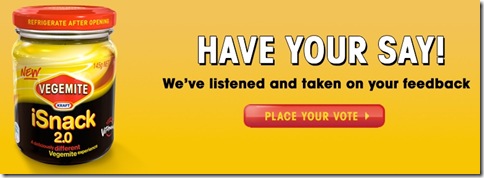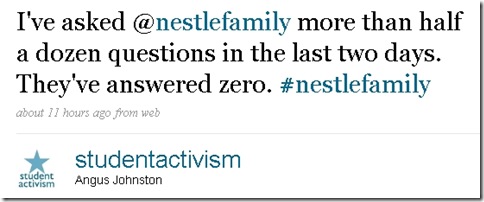Home » humour (Page 5)
Category Archives: humour
Farmville.
The truth about Farmville …
Digital Culture Links: January 7th 2010
Links for January 6th 2010 through January 7th 2010:
- New Video: Protecting Reputations Online in Plain English [Common Craft] – Great new Common Craft video looking at reputation management, especially in terms of thinking about what poeple share today and what that means tomorrow!
- Aliases, creeping, and wall cleaning: Understanding privacy in the age of Facebook by Kate Raynes-Goldie [First Monday 15.1, Jan 2010] – Timely look at Facebook, privacy and young adults: “This paper explores how 20–something Facebook users understand and navigate privacy concerns. Based on a year–long ethnographic study in Toronto, Canada, this paper looks at how — contrary to many mainstream accounts — younger users do indeed care about protecting and controlling their personal information. However, their concerns revolve around what I call social privacy, rather than the more conventional institutional privacy. This paper also examines the somewhat subversive practices which users engaged in to enhance their own social privacy, and in some cases, violate that of others. Finally, this paper examines some of the reasons that users may continue using the site, despite privacy concerns.”
- Rogue Marketers Can Mine Your Info on Facebook [Wired.com] – Another reason Facebook’s new privacy settings suck: “Got an e-mail list of customers or readers and want to know more about each — such as their full name, friends, gender, age, interests, location, job and education level? Facebook has just the free feature you’re looking for, thanks to its recent privacy changes. The hack, first publicized by blogger Max Klein, repurposes a Facebook feature that lets people find their friends on Facebook by scanning through e-mail addresses in their contact list. But as Klein points out, a marketer could take a list of 1,000 e-mail addresses, either legally or illegally collected — and upload those through a dummy account — which then lets the user see all the profiles created using those addresses. Given Facebook’s ubiquity and most people’s reliance on a single e-mail address, the harvest could be quite rich.”
- The MLA, @briancroxall, and the non-rise of the Digital Humanities [academhack] – An interesting follow-up to the social media prominence of Brian Croxall’s MLA paper: “two observations: 1. The fact that Brian’s making public of his paper was an oddity worth noticing means that we are far away from the rise of the digital humanities. 2. The fact that a prominent digital scholar like Brian doesn’t even get one interview at the MLA means more than the economy is bad, that tenure track jobs are not being offered, but rather that Universities are still valuing the wrong stuff. They are looking for “real somebodies” instead of “virtual somebodies.” Something which the digital humanities has the potential of changing (although I remain skeptical).” [Via Chuck]
- Pocohontar [Boing Boing] – Yes, James Cameron’s Avatar is very similar to Disney’s Pocahontas and here’s the script treatment to “prove” it.
- Apple’s App Store Downloads Top Three Billion – Just as Google unveils their Nexus One phone, Apple reminds everyone that their App store will be a hard one to beat: “Apple® today announced that more than three billion apps have been downloaded from its revolutionary App Store by iPhone® and iPod touch® users worldwide. “Three billion applications downloaded in less than 18 months—this is like nothing we’ve ever seen before,” said Steve Jobs, Apple’s CEO. “The revolutionary App Store offers iPhone and iPod touch users an experience unlike anything else available on other mobile devices, and we see no signs of the competition catching up anytime soon.”” 3 billions apps … wowzers!
VegeSmite? Some quick thoughts on #vegefail & #nestlefamily
Twitter hastags are quickly becoming the popular shorthand to express corporate disasters with social media. Two cases in point recently: #vegefail, the dramatic, vitriolic and 100% negative response to Kraft naming a new Vegemite and Cheese product ‘iSnack 2.0’ after opening to public suggestions, and #nestlefamily in which the many, many questionable practices for Nestle regarding infant formula, and other things, resurfaced as the company courted influential ‘mummybloggers’ (a shorthand which, I gather, should really be ‘parent bloggers’ since some dads blog in this fashion, too).
First, Kraft: while having a national competition to name the new Vegemite product actually seemed a great way to harness Aussie love for all things Vegemite, especially when you receive more than 50,000 suggestions, letting Kraft simply pick a winner from all those suggestions was not such a good plan, especially when they picked ‘iSnack 2.0’ (which might be a good name for Steve Jobs’ new toaster, but not for an Australia food icon). Since the announcement last Saturday, there has been complaints, loud, angry, and funny (see one person’s response Downfall meme style! and the satirical iSnack 2.0 Twitter stream) but at the same time, the love for Vegemite was the most thing most central in these responses. All the complaints may have looked like a massive marketing fail (hence #vegefail) yet Kraft have announced today (a mere 6 days later) that they’re going back to the drawing boards and getting another new name:
In the end, though, I tend to agree that the iSnack 2.0 reaction was far from a PR disaster – whether planned from the beginning, or a clever reaction to overwhelming customer sentiment, in going back to their consumers and letting them vote once again (albeit from six safe and crappy names) Kraft both reminded most Australians how much they care about Vegemite and got more publicity for a new product than you could possibly generate with a traditional advertising campaign. (And despite the cynicism, yes, I’ve voted.)
By contrast, the recent #nestlefamily controversy erupted when Nestle attempted to court influential ‘mummybloggers’ in the US by inviting 20 or so of them to a paid retreat where Nestle could show off their latest products and get authentic mummyblogger feedback. However, Nestle seemed to give no thought at all to what openly courting social media attention might actually mean. On hearing about the planned event, and noting that some of the attendees were people she respected, PhD in Parenting wrote a long post entitled ‘An open letter to the attendees of the Nestle Family blogger event’ which reminded a lot of people about the many issues with Nestle as a company, including their long history of unethical behaviour, especially in relation to infant products, most notably, of course, being pushing infant formula in Africa. Needless to say, before the event even started, a massive debate began on Twitter between supporters and detractors of Nestle; the oddest thing, though, was the deafening silence from Nestle. For most of the debate, they remained silent and let people rage on blogs and Twitter. In leaving others to defend Nestle, some of the most angry defenders have clearly done more harm than good. I don’t have time to go too far into the details, but I recommend reading the summary by Crunchy Domestic Goddess which gives an even-handed overview of the guts of the debate in terms of the way social media has been used.
Then, in a last ditch effort, Nestle have officially joined Twitter to try and manage the #nestlefamily debates, but they still don’t understand that this is a conversation, not a PR engine. At the end of the day, this tweet seems to sum up perfectly why Nestle just don’t get social media:
Of course, now that questions are being asked loudly, if Nestle doesn’t answer them, others will.
The difference between Nestle and Kraft is simple: at the end of the day, Kraft listened and that was their salvation. Nestle could learn from their corporate cousin.


